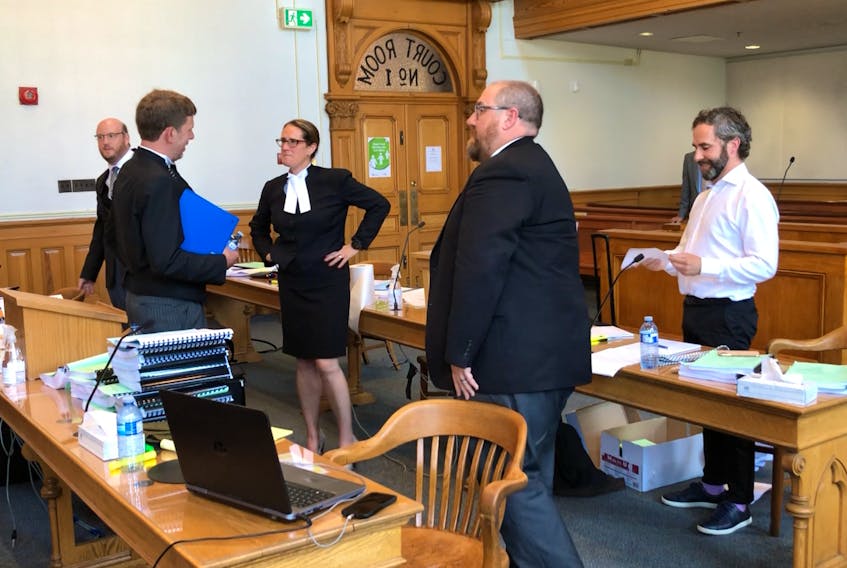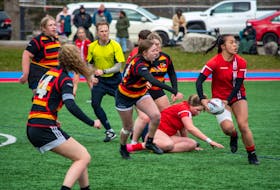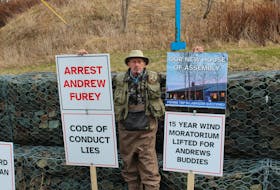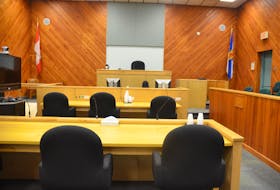ST. JOHN'S, N.L. — Supreme Court Justice Donald Burrage has upheld the province’s travel ban, but lawyers who argued against it are calling the ruling a mixed victory.
Kim Taylor, who was born in Newfoundland and Labrador but resides in Halifax, applied for a travel exemption to enter the province after her mother died suddenly on May 5. Taylor emailed the province, made arrangements to self-isolate for 14 days upon arrival and arranged a flight to the province. Taylor’s request was denied by the Office of the Chief Medical Officer of Health.
On May 14, Taylor asked the office to reconsider and on May 16 she was granted an exemption and allowed to enter the province. As a result of the initial rejection, she challenged the travel ban on the grounds that her charter rights to mobility and right to liberty had been infringed upon by the ban.
In his 137-page decision, Burrage did find that Taylor’s right to mobility was infringed by the initial rejection, but “the infringement was fleeting” given Taylor was granted the exemption eight days after the rejection.
The infringement falls under Section 6(2) of the Charter of Rights and Freedoms, which states “every citizen of Canada … has the right a) to move and take up residence in any province; and b) to pursue the gaining of a livelihood in any province.”
Burrage found Taylor’s right to mobility was not infringed by the travel ban because she “did not seek to travel to this province to earn a livelihood or take up residence.”
Section 7 of the charter guarantees “the right to life, liberty and security of the person and the right not to be deprived thereof except in accordance with the principles of fundamental justice.”
On that front, Burrage concluded that Taylor’s “liberty interests” were not infringed within the meaning of Section 7.
Burrage agreed with Chief Medical Officer of Health Dr. Janice Fitzgerald’s assertion that “the biggest risk is an introduction of the disease from importation from other jurisdictions.”
“The objective of the travel restriction was not to interfere with Ms. Taylor’s rights, but to protect those in Newfoundland and Labrador from illness and death arising from the importation and spread of COVID-19 by travellers,” Burrage wrote in his decision.
Burrage ruled that while the travel ban is just one of the approaches public-health officials have taken to stem the spread of COVID-19 in the province, it is integral to the overall strategy.
“I am satisfied based on the evidence presented that the travel restriction represents a reasonable limit on Ms. Taylor’s right to mobility, as demonstrably justified in a free and democratic society,” reads the decision.
Burrage dismissed the application and found each party to the case responsible for their own costs.
'Partial win': lawyers
Lawyer Rosellen Sullivan told The Telegram she wasn’t shocked by the judge’s decision and considers it a partial win.
While the province’s lawyers had argued that inter-provincial travel is not a protected right under the charter, Burrage ultimately sided with Sullivan and Drover, who argued it is.
“I actually consider this a win in respect to (the mobility rights aspect of the challenge),” she said. “For the province to even suggest that mobility rights within Canada are not protected by the constitution frankly floored me. From that perspective, yes, we consider it a victory. It’s a good day and a bad day."
Sullivan said she was disappointed with Burrage’s decision to deny the Canadian Civil Liberties Association (CCLA) standing on the issue of enforcement, maintaining it’s still worth arguing.
“We basically have to wait until someone’s rights get breached, which is not ideal,” she said.
Sullivan said she and the CCLA will review the judge’s decision to determine whether or not to appeal it, and will examine in particular whether the court had put the onus properly on the province to justify why it had breached the charter, or if it had instead left it up to Taylor and the CCLA to prove the breach wasn’t justified.
Regardless, Sullivan said, she hopes the provincial government doesn’t take the judge’s ruling as a carte blanche when it comes to the travel ban.
“It is not acceptable that the government just says, ‘We’re doing this, take us to court if you want.’ (Burrage) did find it was a breach, it just so happens that he found in this case government was justified. I think it requires a lot more consideration at the front end when government is making these decisions. They can’t just make them without accountability.
“What might have been justified in April when the decision was made may not be justified now,” she said. “The province still has an obligation to look at that ban routinely and I hope they don’t see this as some sort of free pass.
“The message in this is that this is a breach of a constitutionally protected right.”
Public-health victory
Health and Community Services Minister Dr. John Haggie says his department is reviewing the decision, but he is pleased with the outcome of the case.
“From our point of view, this isn’t something we wanted to do. It’s something we felt we had to do,” said Haggie.
“It was done out of the desire to protect the health and well-being of Newfoundlanders and Labradorians. It’s gratifying the court has validated that approach, but obviously staff here and in the attorney generals’ office will give us a detailed analysis of that.”
Fitzgerald says her office will prepare for an appeal of Burrage’s decision, but no changes to the public-health approach will come from the decision at this time.
“I guess we’ll cross that bridge when we come to it. But we’ll continue on with all the other public-health measures that we’ve had in place and we’ll make sure that our public-health capacity is ready to respond,” she said.
“We’ll do what we have to do. But at the moment, we’re not there and we’re going to continue on as we’ve been doing.”
With files from Peter Jackson









